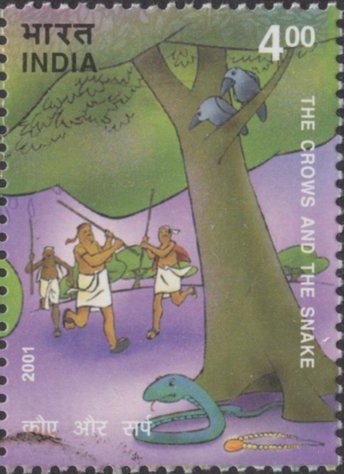Panchatantra Series – Snake Attacked by Villagers

Technical Data
| Stamp Set | Tales from the Panchatantra |
|---|---|
| Date of Issue | October 17, 2001 |
| Denomination | Rs. 4 |
| Quantity | 3,000,000 |
| Perforation | comb 13 |
| Printer | Madras Security Printers |
| Watermark | No Watermark |
| Colors | Multicolor |
| Catalog Codes |
Michel IN 1867 Stamp Number IN 1922b Yvert et Tellier IN 1631 Stanley Gibbons IN 2032 |
| Themes | Animals (Fauna) | Birds | Mammals | Reptiles | Snakes |
Commemorative Stamp Set: Snake Attacked by Villagers – Panchatantra Series
Table of Contents
Design Elements
This stamp depicts the climactic scene where the villagers, alerted by the clever crows, attack the snake to retrieve the stolen jewel necklace. The central figure of the stamp is the snake, coiled in a defensive posture, as the villagers approach with sticks and tools. The background shows a simple village setting with huts and trees, creating a sense of community and unity. The tension in the moment is captured through dynamic lines and vivid colors, with the green of the snake and the shimmering gold of the necklace standing out against the earthy tones of the villagers and their surroundings.
The stamp highlights the contrast between the snake’s malevolent intentions and the villagers’ righteous actions. It uses bold imagery to show the power of intelligence and collaboration, with the villagers uniting to remove the danger posed by the snake.
Cultural and Historical Significance
This story, from the Panchatantra, represents the triumph of wit over physical strength. It teaches the lesson that sometimes it takes clever thinking and teamwork to overcome a menace. The Panchatantra’s tales have been a vital part of Indian folklore and moral education for centuries, and this scene reinforces the values of community, protection, and resourcefulness.
By including this story in the commemorative stamp series, the Department of Posts acknowledges the important role of ancient Indian literature in shaping social and cultural values. The story also emphasizes that the weak can triumph over the strong through cleverness, a recurring theme in the Panchatantra.
Usage
This stamp can be used for general postal purposes, while also appealing to collectors, literature enthusiasts, and educators. The vivid depiction of this story serves as a reminder of the importance of community cooperation and strategic thinking in overcoming adversity, making it particularly relevant in educational contexts.
Importance of the Commemorative Stamp Set
The Panchatantra series, including this dramatic stamp of the snake being attacked by villagers, helps preserve India’s cultural and literary heritage. It ensures that these ancient moral stories continue to inspire and educate. This particular scene illustrates the power of unity and the ability to overcome danger through strategy, values that are timeless and universally applicable. The stamp set, by featuring key moments from Panchatantra, bridges the past with the present, offering lessons in ethics, teamwork, and resilience.
Example of the Stamp Design
The stamp presents a detailed scene of villagers converging on the snake, with their tools raised in defense of their community. The snake’s gleaming scales and the sparkling necklace draw the eye, while the villagers are depicted with expressions of determination. The title “Snake Attacked by Villagers” is inscribed at the bottom, with the Panchatantra Series title above.
The commemorative stamp set might include:
- The Lion and the Rabbit – showcasing intelligence triumphing over strength.
- The Monkey and the Crocodile – highlighting quick thinking and deception.
- The Crows and the Snake – focusing on strategy to protect family.
- The Foolish Tortoise – teaching caution and self-awareness.
Significance
The stamp illustrates the crucial moment where the villagers defeat the snake, symbolizing the power of collective action and intelligence. The Panchatantra stories continue to offer moral guidance, and this scene in particular represents the value of using cleverness to outwit dangerous foes. The commemorative stamp ensures these timeless lessons remain relevant to contemporary society, honoring India’s rich storytelling traditions.
